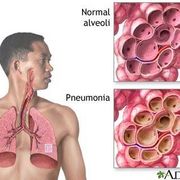 Klebsiella pneumonia
Klebsiella pneumoniais a Gram-negative, immobile, encapsulated, lactose fermentation, facultative anaerobic, rod forms of bacteria are normal flora of the mouth, skin and intestine. This is the most important member of the genus Klebsiella Enterobacteriaceae. It is naturally occurring in soil and about 30% of strains can fix nitrogen under anaerobic conditions. Hans Christian Gram developed a technique now known as Gram staining in 1884 to distinguish between C. pneumonia and pneumococcus. Bacteria were named after German bacteriologist Edwin Klebs. Klebsiella pneumonia were killed in the wild. This procedure has been available for some time, but a greater risk of bacterial resistance exists for phages than antibiotics. Resistance to phage can cause flowering in number of microbes in the environment and humans. Phage therapy is used only in combination with antibiotics. The study involved molecular mimicry between HLA-B27 and two Klebsiella moleculars surface as the cause of Bekhterev's disease. Infections in general tend to occur in people with weakened immune systems from unhealthy diet. Many infections occur when a person enters the hospital. Antibiotic resistance strains emerge. It ranks second in Escherichia coli urinary tract infections in elderly people. Patients with chronic pulmonary diseases, enteric pathogenicity, nasal mucosa atrophy, and rhinoscleroma are easy targets for Klebsiella. Kal is the most common cause of infection. CRKP stable almost all available antimicrobial agents and CRKP infections is cause high morbidity and mortality. Karbapenem often used as a medicinal product in extreme cases, when the fight resistant bacterial strains. CRKP most important mechanism of resistance is carbapenemase production of the enzyme. Gene, which encodes an enzyme produced by some mobile genetic material. CRE difficult to detect because some strains harboring blakpc with purchase strattera minimum inhibitory concentration. These strains are sensitive to karbapenemam. Patients infected are in contact precautions. Acute health care facilities to establish a protocol in conjunction with the guidelines of clinical and laboratory standards institute. Effective sterilization and disinfection procedures is important to keep the rate of this antibiotic-resistant strain, CRKP as low as possible. .
No comments:
Post a Comment